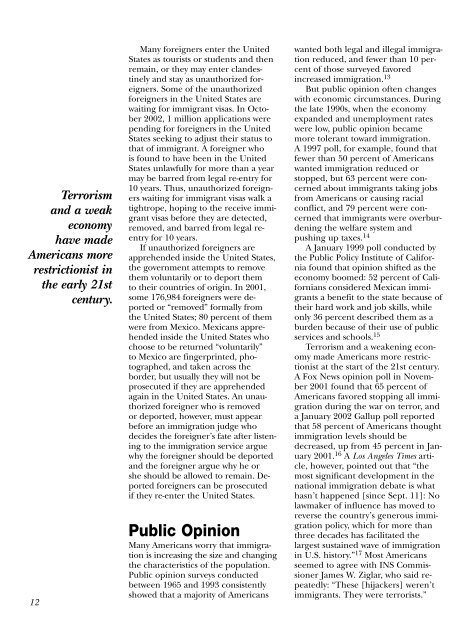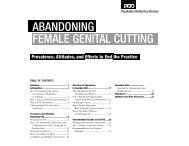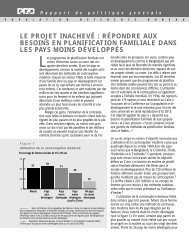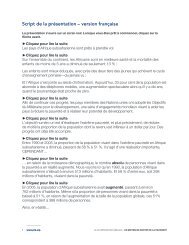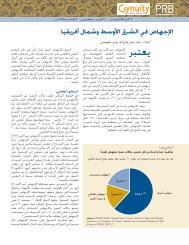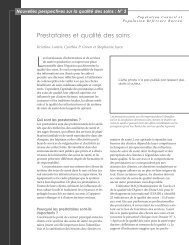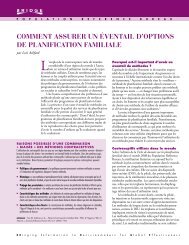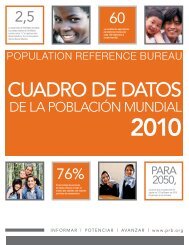Immigration Shaping America - Population Reference Bureau
Immigration Shaping America - Population Reference Bureau
Immigration Shaping America - Population Reference Bureau
Create successful ePaper yourself
Turn your PDF publications into a flip-book with our unique Google optimized e-Paper software.
Terrorism<br />
and a weak<br />
economy<br />
have made<br />
<strong>America</strong>ns more<br />
restrictionist in<br />
the early 21st<br />
century.<br />
12<br />
Many foreigners enter the United<br />
States as tourists or students and then<br />
remain, or they may enter clandestinely<br />
and stay as unauthorized foreigners.<br />
Some of the unauthorized<br />
foreigners in the United States are<br />
waiting for immigrant visas. In October<br />
2002, 1 million applications were<br />
pending for foreigners in the United<br />
States seeking to adjust their status to<br />
that of immigrant. A foreigner who<br />
is found to have been in the United<br />
States unlawfully for more than a year<br />
may be barred from legal re-entry for<br />
10 years. Thus, unauthorized foreigners<br />
waiting for immigrant visas walk a<br />
tightrope, hoping to the receive immigrant<br />
visas before they are detected,<br />
removed, and barred from legal reentry<br />
for 10 years.<br />
If unauthorized foreigners are<br />
apprehended inside the United States,<br />
the government attempts to remove<br />
them voluntarily or to deport them<br />
to their countries of origin. In 2001,<br />
some 176,984 foreigners were deported<br />
or “removed” formally from<br />
the United States; 80 percent of them<br />
were from Mexico. Mexicans apprehended<br />
inside the United States who<br />
choose to be returned “voluntarily”<br />
to Mexico are fingerprinted, photographed,<br />
and taken across the<br />
border, but usually they will not be<br />
prosecuted if they are apprehended<br />
again in the United States. An unauthorized<br />
foreigner who is removed<br />
or deported, however, must appear<br />
before an immigration judge who<br />
decides the foreigner’s fate after listening<br />
to the immigration service argue<br />
why the foreigner should be deported<br />
and the foreigner argue why he or<br />
she should be allowed to remain. Deported<br />
foreigners can be prosecuted<br />
if they re-enter the United States.<br />
Public Opinion<br />
Many <strong>America</strong>ns worry that immigration<br />
is increasing the size and changing<br />
the characteristics of the population.<br />
Public opinion surveys conducted<br />
between 1965 and 1993 consistently<br />
showed that a majority of <strong>America</strong>ns<br />
wanted both legal and illegal immigration<br />
reduced, and fewer than 10 percent<br />
of those surveyed favored<br />
increased immigration. 13<br />
But public opinion often changes<br />
with economic circumstances. During<br />
the late 1990s, when the economy<br />
expanded and unemployment rates<br />
were low, public opinion became<br />
more tolerant toward immigration.<br />
A 1997 poll, for example, found that<br />
fewer than 50 percent of <strong>America</strong>ns<br />
wanted immigration reduced or<br />
stopped, but 63 percent were concerned<br />
about immigrants taking jobs<br />
from <strong>America</strong>ns or causing racial<br />
conflict, and 79 percent were concerned<br />
that immigrants were overburdening<br />
the welfare system and<br />
pushing up taxes. 14<br />
A January 1999 poll conducted by<br />
the Public Policy Institute of California<br />
found that opinion shifted as the<br />
economy boomed: 52 percent of Californians<br />
considered Mexican immigrants<br />
a benefit to the state because of<br />
their hard work and job skills, while<br />
only 36 percent described them as a<br />
burden because of their use of public<br />
services and schools. 15<br />
Terrorism and a weakening economy<br />
made <strong>America</strong>ns more restrictionist<br />
at the start of the 21st century.<br />
A Fox News opinion poll in November<br />
2001 found that 65 percent of<br />
<strong>America</strong>ns favored stopping all immigration<br />
during the war on terror, and<br />
a January 2002 Gallup poll reported<br />
that 58 percent of <strong>America</strong>ns thought<br />
immigration levels should be<br />
decreased, up from 45 percent in January<br />
2001. 16 A Los Angeles Times article,<br />
however, pointed out that “the<br />
most significant development in the<br />
national immigration debate is what<br />
hasn’t happened [since Sept. 11]: No<br />
lawmaker of influence has moved to<br />
reverse the country’s generous immigration<br />
policy, which for more than<br />
three decades has facilitated the<br />
largest sustained wave of immigration<br />
in U.S. history.” 17 Most <strong>America</strong>ns<br />
seemed to agree with INS Commissioner<br />
James W. Ziglar, who said repeatedly:<br />
“These [hijackers] weren’t<br />
immigrants. They were terrorists.”


